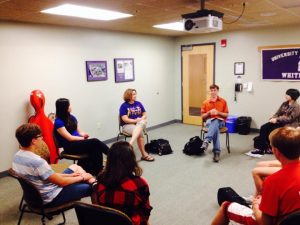Broaching the Taboo of Performance Anxiety

Me (in the orange) leading a workshop on overcoming performance anxiety at UW-Whitewater, August 9, 2014.
Last week, I wrote about the many benefits that regular exercise can afford performers, including that of reducing “anxiety sensitivity” (reacting negatively to anxious symptoms). Fittingly, this past weekend I was asked to speak on the matter while teaching at a high school orchestra retreat. The retreat, which took place at the University of Wisconsin-Whitewater, gave 125 high schoolers an opportunity to study chamber music, technique, and other aspects of performance prior to the start of the school year (which, to general dismay, happens in the third week of August here in the Midwest). I served in a variety of capacities, including those of chamber coach, performer, and chaperone (a first!), but the most rewarding time I spent was as a panelist in a seminar focused exclusively on overcoming performance anxiety.
While some of the other classes offered to the students were more formally structured, the other panelists and myself decided to make the performance anxiety seminar friendly and discussion-based to help the students feel more at ease, since the goal was to have them ask questions and share their own experiences. Although somewhat timid at first, the students eventually began to come out of their shells, and we had a remarkably candid discussion. Everyone shared struggles they had experienced in performances and auditions–sweaty hands, shaky bow arms, debilitating muscle tension–and us panelists discussed similar impediments we’d faced, and how we’d overcome them. By the end, the atmosphere in the room was decidedly optimistic, and the students left seeming significantly more confident as they prepared to face the following day’s recitals.
What was most striking to me, however, was the wonderful feeling of liberation I felt personally after our discussion. While I’ve thought a lot about dealing with nerves, I seldom broached the topic with my colleagues during the time I spent in music school, and I often got the sense that many of them felt genuinely awkward bringing it up. My observation was that people tended to fall into two different camps: those who bemoaned their inner turmoil in order to receive attention and reassurance (“OMG, I’m going to bomb in studio class….I’m so unprepared….”–sound familiar?), and those who attempted to hide it at all costs (“Yeah, I’m doing Prokofiev Sinfonia Concertante tonight. Should be good.”–you can’t tell me you’re not nervous to play that piece). However, any psychologist will tell you that neither of these approaches will do little good, because the key to overcoming nerves is not to eliminate them, but to embrace them. Somehow, however, this bit of logic seems to be lost on a lot of people, and so those of us who teach should strive to impart it to all of our students.
I recall taking a string pedagogy class in which the teacher told us not to tell our students they should “expect” to be nervous, and not discuss it unless it becomes an issue for a student. This makes sense, but if it is an issue, it should definitely be discussed, and delicately. Students should not feel ashamed of being nervous, or feel as though it is a weakness. Even more crucial is their understanding that even great performers experience nerves. In our seminar at Whitewater, I brought up the fact that people like Vladimir Horowitz and Renée Fleming have dealt with stage fright, and many of the attendees looked shocked. I explained that, no matter how prodigious one’s skills may be, there is always a chance of failure, since, try as we might, humans are most definitely not perfect. Therefore, it makes no difference whether you’re a freshman in high school or Itzhak Perlman; we all are susceptible to nervousness. The difference, of course, is that some of us (like Perlman) are better at overcoming it than others.
All this said, I think it’s important not to ask a student, “Were you nervous??” directly following an audition or performance. This has happened to me on a couple occasions, and I always felt awkward and embarrassed. Sure, if nerves have derailed a student onstage, it should certainly be discussed, but not under the pretense of questioning whether it was in fact nerves that caused the subpar performance. If you’ve been teaching a student for a while and know how they sound at their best, it should be obvious that the unpleasant tremelo additions in the sostenuto passage are due to nerves (unless the student in question went overboard with the espresso an hour before–another thing to warn against!), and even if you’re an adjudicator listening to a student for the first time in an audition, it’s not as if you’re going to revise your evaluation upon learning that nerves were to blame for a mediocre presentation. This may sound pretty obvious, but believe me, I’ve seen it happen a lot. There is a time for reflection and learning, but it’s not while the sweat is still glistening on the student’s fingerboard.
People have written entire books (or, in the case of Noa Kageyama, countless blogs) on this topic, so I’m not going to get into the details of the psychological and physical aspects of overcoming performance anxiety, but I do want to emphasize how critical it is to have an open discussion about it, both with our students and our colleagues. After all, the ultimate goal of studying an instrument is to perform, and so developing a student’s ability to perform well under pressure should be a primary focus of any teacher. Watching those students leave the classroom last Saturday, with the newfound knowledge that it’s very possible to manage nerves, was a truly inspiring moment–and as a teacher, I can think of few better goals than to help other students achieve that same unassailable confidence.

